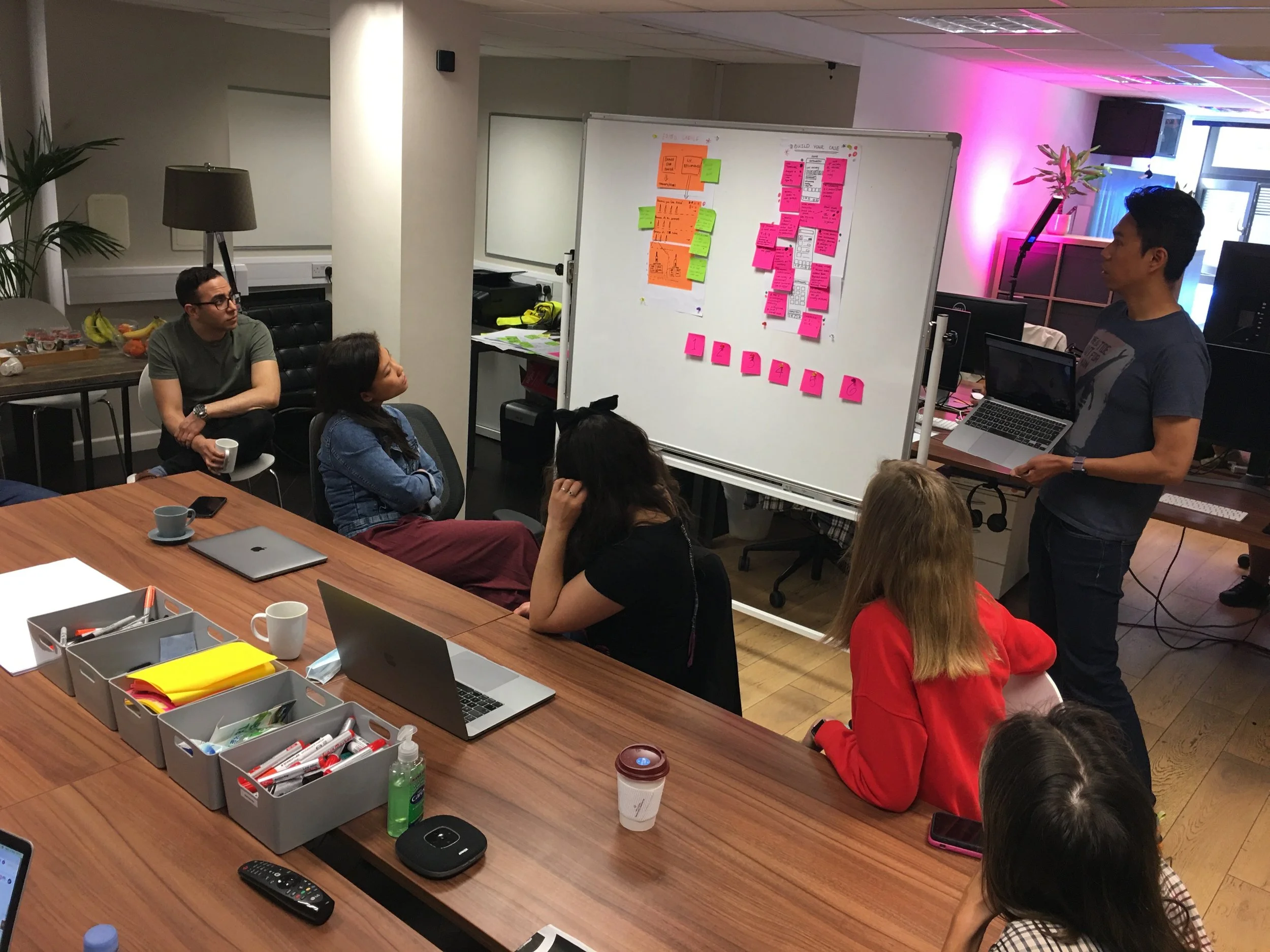
Drive KEY eco-driving companion
Driving positive environmental change with Karai
Team formation
2 Senior designers (Myself included)1 Midweight UI designer 1 Product owner1 Business developer2 Project managers4 Developers (IOS/Android)1 Creative director1 Senior designer
Strategy & roadmap
To ensure the longevity and future readiness of Karai, we collaborated with DriveKey to oversee their feature roadmap, technical architecture, vendor selection, and requirements management. In crafting the user experience, strategic business canvases were developed, employing our established idea evolution process rooted in agile methodologies to deliver optimal business value for DriveKey.
With an eye toward international launch and sustained application relevance, the development team engineered the backend to facilitate data scalability, support for international currencies, and a multi-country vehicle database.
Karai emerges as a data analytics-driven, performance-tracking AI driving companion application. It monitors vehicle carbon emissions in real-time, while the integrated carbon credit management platform automates the carbon offsetting process. The user experience is intuitive, efficient, and dedicated to advancing the global carbon reduction initiative through impactful projects worldwide.The Challenge
The typical carbon footprint of an individual in the UK stands at 10 tonnes of CO2 annually, encompassing 2 tonnes attributed to travel. For those covering 10,000 miles per year by driving, this figure increases by an additional 4 tonnes of CO2. However, by adopting efficient driving practices, emissions can potentially be reduced by up to 25%.
With a mission to offer products and services aiding individuals and businesses in making environmentally conscious decisions for the sake of future generations, DriveKey enlisted us to conceptualize and create Karai – an AI-driven eco-driving companion. Karai monitors CO2 usage and enables users to offset their carbon footprint, empowering them to diminish their environmental impact by promoting eco-sensitive driving habits.
RESEARCH, TESTING &PLANNING
In the dynamic convergence of environmental consciousness and digital innovation, the development of the Karai app by DriveKey required a meticulous and strategic approach. As the UX/UI Design Lead entrusted with crafting this digital solution, the journey commenced with an immersive discovery workshop. This workshop not only aligned design goals with business objectives but also initiated a comprehensive exploration into user needs and industry landscapes.The narrative of our Research & Planning phase, a pivotal stage where insights from users, competitive analyses, and strategic planning converged to chart the trajectory for an exceptional carbon-offsetting app. From collaborative brainstorming sessions to refining the Minimum Viable Product (MVP) requirements, our exploration aimed not only to meet but to exceed user expectations while remaining true to DriveKey's mission.Our research canvas was expansive, spanning from user interviews and desktop research to analyzing industry trends. A strategic SWOT analysis served as the foundation, providing insights into internal dynamics and external market forces that would influence our design decisions. User personas, derived from real-world interactions and validated by stakeholders, guided our design process, ensuring resonance with the diverse needs of DriveKey's users.We looked beyond the present, mapping out a roadmap that not only led to the MVP but also extended into the future. This roadmap envisioned post-MVP enhancements that would propel the Karai app into a world of sustained excellence in carbon offsetting. Regular validation, facilitated by ongoing user testing, transformed our roadmap into a dynamic document, adaptable to the evolving needs and preferences of our conscientious user base.
USER FLOWS AND WIREFRAMES
Moving into the wireframing phase was an exciting step for me as a UX designer. This stage involved bringing our ideas to life in a more tangible way, creating skeletal outlines of the app's layout and features. These wireframes weren't just drawings; they were essential tools for testing and refining our designs. By visualizing the app's structure, we could better understand how users would interact with it and uncover any potential issues early on. This hands-on approach allowed us to fine-tune the user experience iteratively, ensuring that DriveKey's users would have a seamless and enjoyable journey through the app.
Branding and user interface
In my journey as a UX/UI designer, I was dedicated to crafting an entire visual identity for DriveKey's app that users would love and trust. It all started with designing the logo, which became the heart of the brand's personality. From there, I dove deep into developing a brand manual, like a guidebook that ensured every colour, font, and image reflected DriveKey's essence consistently. and most importantly worked on building a digital design system, which was like laying the foundation for a sturdy house. This system made sure that every element in the app, from buttons to navigation bars, felt familiar and intuitive to users, creating a seamless experience they could rely on. With every pixel I crafted, I kept DriveKey's users in mind, aiming to not just meet their expectations but to exceed them, making their journey through the app enjoyable and memorable.
At the helm of the situation
By integrating Karai into the vehicle, the aim is to extend its functionality beyond just a mobile app, ensuring it's readily accessible where drivers typically engage. This encompasses overseeing exhaust CO2 emissions, evaluating the impact of service parts, and calculating total net CO2 versus offset figures. At the heart of this is the eco-driving score, reflecting the driver's behavior behind the wheel.
"Carbon offsetting offers a straightforward yet impactful method of neutralizing the carbon dioxide emissions generated by a user's vehicle. It involves supporting initiatives such as re-wilding, reforestation, and renewable energy projects, which not only absorb CO2 but also contribute to biodiversity, employment, and habitat preservation, among other benefits. Karai provides users with the option to offset their carbon footprint by contributing to independently vetted and verified projects directly through the app, empowering them to make a positive environmental impact.Business Contributing to a net zero world
Expanding upon the existing app, additional phases were developed to incorporate functionalities such as tracking business trips, managing employee expenses, and generating business reports. Leveraging the app's existing architecture and structure, we seamlessly integrated individual and business trips, broadening the product's appeal to a larger audience and target market. Factors such as driving habits, vehicle type, and distance traveled were considered in calculating the price per mile, which in turn contributed to business summaries.
With its comprehensive features and intuitive interface, the app has become an invaluable tool for drivers. It not only enables them to actively participate in environmental conservation efforts but also fosters a sense of responsibility and accountability for their ecological footprint.Conclusion
The Karai case study showcases the evolution of an AI-driven eco-driving companion developed by DriveKey, aimed at empowering individuals to reduce their carbon footprint while driving. The project began with a meticulous approach to align design aspirations with business goals, leading to the creation of strategic business canvases and the implementation of an agile idea evolution process. Through continuous research and planning, insights from users, competitive analyses, and strategic SWOT analysis were integrated into the development process, ensuring alignment with DriveKey's mission.The project encompassed various phases, including wireframing, UI design, and the creation of a robust design system to ensure consistency and usability across the app. Karai's features were carefully designed to monitor vehicle carbon emissions in real-time, automate carbon offsetting processes, and provide users with a simple and effective user experience.Furthermore, the project expanded to incorporate functionalities such as tracking business trips, managing employee expenses, and generating business reports, leveraging the existing architecture of the app to seamlessly blend individual and business trips.Overall, Karai stands as a testament to DriveKey's commitment to environmental conservation and sustainability, offering users a valuable tool to actively contribute to carbon reduction efforts while fostering a sense of responsibility and accountability for their ecological footprint.















